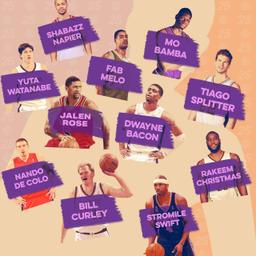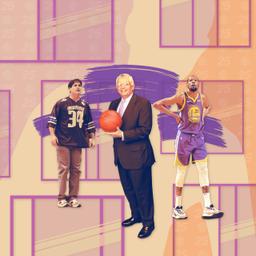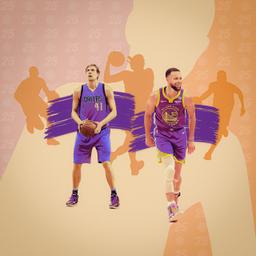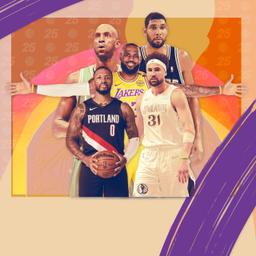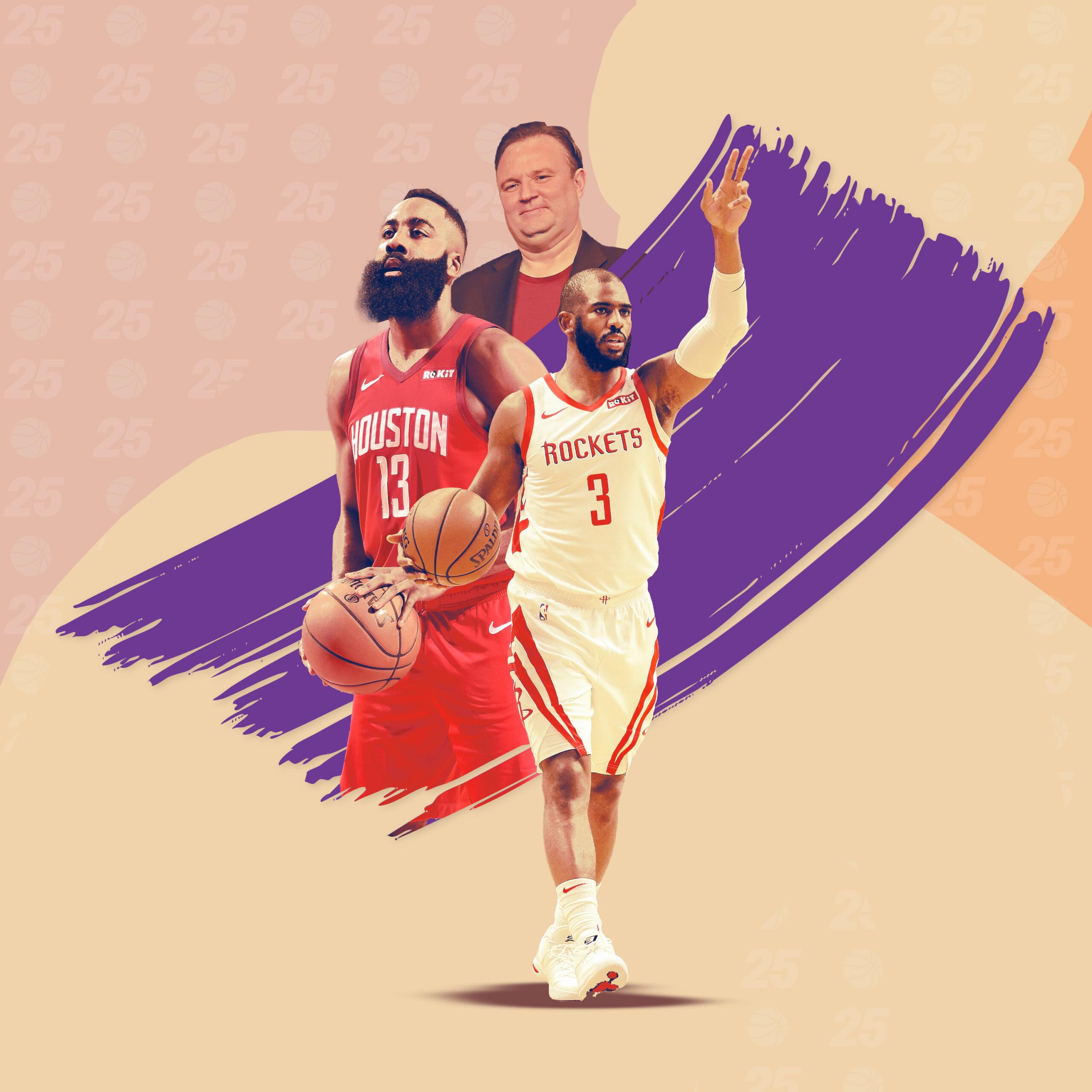
It’s NBA Quarter-Century Week at The Ringer, continuing our site’s yearlong package examining the best of the best—from movie performances to NFL teams to video games—of the past 25 years. This week, we’re focusing on basketball and some of our favorite people and teams lost to time.
Few things in sports sting more than watching a special team fall short of appropriately set championship expectations. Seasons are long. Competition is relentless. Stakes are high. Regret, speculation, and heartbreak last forever.
For The Ringer’s ongoing quarter-century project, I’ve spent the past few weeks thinking about awesome teams that never reached the NBA Finals, wondering which one should be remembered as the best to never make it. Put another way, whose failure to get over the proverbial hump has caused the most pain in their fan base?
From the 2000 Portland Trail Blazers to the 2002 Sacramento Kings to the 2004 Minnesota Timberwolves to the 2007 Phoenix Suns to the 2012 Chicago Bulls to the 2021 Brooklyn Nets to half a dozen other candidates who deserve a shout-out, the past 25 years have had their fair share of title-worthy, era-representative contenders that are unforgettable for a variety of reasons, from their influence and excellence, to, sadly, the various degrees of rotten luck that spoiled what could have been.
To me, the 2018 Houston Rockets reside a centimeter above the field. Engineered by Daryl Morey, guided by Mike D’Antoni, propelled by James Harden, and enriched by Chris Paul, they were the peak of a groundbreaking half-decade run that paired ingenious star power with a system designed to heighten all the players’ finest qualities. Not only were they a steamroller, but those Rockets also helped accelerate basketball’s embrace of a two-way style that defines the age we currently live in.
The Rockets finished that regular season with the fourth-highest winning percentage of any team that didn’t reach the Finals in this century. They won 65 games and finished first in net rating, first in offensive rating, and—most notably, considering the long-standing reputations held by their head coach and best player—seventh in defensive rating. They had Harden, that season’s Most Valuable Player and scoring leader and one of the great individual scheme breakers of all time at the absolute apex of his game. He averaged 30.4 points per game and led the league in 3s, free throws, PER, and usage rate. Not bad.
They also had Paul, another perennial MVP candidate who packed more brainpower into a possession than any player this side of LeBron James. He had shocked the league that offseason by picking up his player option with the Los Angeles Clippers and accepting a trade to the Rockets that would prohibit him from testing free agency and earning a massive payday.
Paul finished the year sixth in assist rate, had what up until then was the second-highest true shooting percentage of his first-ballot Hall of Fame career, and ensured that lineups without Harden would still obliterate the opposition: In the 876 minutes Houston played with Paul and without Harden, its net rating was plus-12.7, per databallr. Of note: CP3 came to the Rockets after six straight seasons making first-team All-Defensive with the Clippers. He was 32 years old and missed 14 of the season’s opening 15 games with a bruised knee, but he could still produce like a two-way tactician of the highest order.
When you go back and look at the rest of the roster, its pure talent might not appear more impressive than that of a few other teams warranting attention at the top of this list. Houston’s third-, fourth-, and fifth-leading scorers were Eric Gordon, Clint Capela, and Gerald Green. Ryan Anderson, Trevor Ariza, and P.J. Tucker all spent lengthy stretches in the starting five.
But what made them so brilliant was their fit. Just about everyone in D’Antoni’s rotation perfectly accentuated Harden and Paul by spacing the floor or being versatile enough to guard several positions on the other end. That latter element was critical, and it helped them mature away from an identity that was bound by an obsession with 3s and speed. In the preceding five years, the Rockets had typically been an imposing 50-plus-win playoff team, but there was something gimmicky about their style of play: From 2013 to 2017, they finished in the top five in transition frequency and didn’t exactly prioritize getting stops on the other end.
That changed in 2018, when they deployed the right pieces to execute one of the better switch-everything schemes we’ve ever seen. D’Antoni’s “Seven Seconds or Less” Phoenix Suns are immortalized by the shape of their impact on myriad successors; the 2018 Rockets were an evolved version, encouraged by statistical models that allowed them to embrace some formerly radical traits in a way that was slightly more amenable to playoff basketball. They shot a crap ton of 3s, yes, but also balanced lineups out with rugged, smart veterans who could switch every screen and hold their own. Not easy!
Of course, that didn’t mean they stopped shooting 3s. In fact, they took and made even more than the previous season’s record-breaking number, advancing an algorithmic style of play that was essentially invented by a calculator. Nerds celebrated their commitment to such a revolutionary attack, while (many) others rebuked Houston’s approach, as if it were a disruptive tech company changing its industry for the worse. These Rockets weren’t the first to bow at the altar of analytics, but by shunning midrange jumpers, living at the free throw line, and constantly attacking the rim in a winning context, they were a harbinger for every breathless “Is the game too homogeneous?” debate that’s been heard ever since.
Harden’s foul baiting was a rhythmic impediment that technically fell within the game’s rule book while violating its spiritual integrity. What could’ve been elegant instead became economic. Effective, sure. But also exasperating.
And speaking of rule books, for all Paul’s wondrous stewardship, crunch-time chops, and elite shotmaking, having Harden share his backcourt with a prodigious stickler whose entire personality seemed to revolve around basketball’s bylaws was not every fan’s cup of tea. But I always found something romantic about D’Antoni getting to coach two Hall of Fame guards who could fulfill his basketball worldview under a general manager who’d endorse the vision instead of tamping it down.
Thanks to what they were up against, a revolutionary mindset was necessary. These Rockets were not built to beat the rest of the NBA so much as they were meticulously constructed to dethrone an incomprehensibly dominant juggernaut that boasted two of the world’s five best players. In 2017, while almost every other team in the NBA decided to retreat from the budding Golden State Warriors dynasty, which now boasted Kevin Durant, Steph Curry, Klay Thompson, and Draymond Green, the Rockets ran chest first toward the storm.
Their inevitable showdown in a coin-toss conference finals was marred by one of the more consequential injuries in recent NBA playoff history, when Paul strained his hamstring near the end of Game 5 (which Houston still won, giving it a 3-2 series lead). Golden State tied it up at home in Game 6, leading to a winner-takes-all battle that every sports fan in Houston probably still thinks about at least once a month.
Before Game 7, when it was revealed that Paul’s strained hamstring would keep him on the sideline, Warriors head coach Steve Kerr summed up his opponent’s conundrum: “[Injuries] are part of the playoffs. We're without Andre [Iguodala]. Different role, obviously, with Chris's scoring, but …”
That sentence’s broken ending speaks for itself. The Rockets were not going to beat the defending champs with one arm tied behind their back; in the series finale, the system that had nearly carried them to a ticker tape parade wound up being their undoing. With 6:43 left in the second quarter, Gordon drilled a 3 that gave the Rockets a 42-28 lead. Against all odds, they had Golden State on the ropes. And then … well, you know what happened next: Houston promptly missed 27 straight 3s and watched its 14-point lead dwindle into a 13-point deficit before Tucker finally broke the 3-point dry spell with 6:28 left in the fourth quarter. Historic futility coupled with horrendous timing.
It’s almost like the Rockets beat themselves, which, if interpreted that way, is a fate far worse than getting chewed up and spit out by an unshakable bogeyman. There’s no shame in the latter result, though; even if there’s no telling the story of these Rockets without including the Warriors, their legacy deserves to expand beyond that tortured defeat.
This group was so bold, disciplined, and, for better or worse, depending on whom you ask, highly influential. It’s a shame that they didn’t get to compete in the NBA Finals. Anyone who watched them spend six months blitzing the rest of the league knows that they deserved to be there. All it took to keep that from happening was a devastating injury at the worst possible time and a conference finals opponent that can credibly refer to themselves as one of the most talented teams NBA basketball has ever seen.


